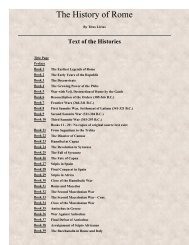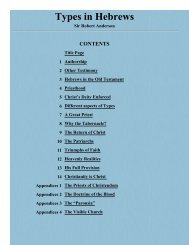The Person of the Holy Spirit - Table of Contents
The Person of the Holy Spirit - Table of Contents
The Person of the Holy Spirit - Table of Contents
You also want an ePaper? Increase the reach of your titles
YUMPU automatically turns print PDFs into web optimized ePapers that Google loves.
1. <strong>The</strong> Extent <strong>of</strong> Old Testament Revelation.<br />
Properly, this field <strong>of</strong> Old Testament revelation includes everything revealed by God in <strong>the</strong> period prior to <strong>the</strong> coming <strong>of</strong><br />
Christ in <strong>the</strong> flesh. In <strong>the</strong> limited boundaries <strong>of</strong> <strong>the</strong> present discussion, revelation is to be considered only in its primary<br />
sense <strong>of</strong> direct communication <strong>of</strong> God to man, without <strong>the</strong> necessary aid <strong>of</strong> written documents. <strong>The</strong> sources <strong>of</strong> information<br />
divide into two well-defined categories. First, <strong>the</strong>re is <strong>the</strong> revelation given to man before inspiration <strong>of</strong> <strong>the</strong> Scriptures was<br />
known. At least two books <strong>of</strong> <strong>the</strong> Old Testament, Genesis and Job, deal with periods <strong>of</strong> time in which <strong>the</strong>re was no inspired<br />
Scripture. While <strong>the</strong> records <strong>of</strong> <strong>the</strong>se books are inspired, <strong>the</strong>y reveal God’s dealings in a period before inspiration. Anything<br />
known <strong>of</strong> God and His ways, any revelation in this period is evidence <strong>of</strong> a great work <strong>of</strong> God to make His truth known. <strong>The</strong><br />
knowledge <strong>of</strong> Job and his companions about God and His ways is pro<strong>of</strong> that prior to written Scripture God had revealed<br />
Himself in definite form. <strong>The</strong> book <strong>of</strong> Job furnishes sufficient material in itself for a well-rounded systematic <strong>the</strong>ology. <strong>The</strong><br />
knowledge <strong>of</strong> revelation on <strong>the</strong> part <strong>of</strong> Job and his friends indicates God had not left Himself without adequate testimony.<br />
Second, <strong>the</strong>re is <strong>the</strong> revelation given to men during <strong>the</strong> period from Moses to Christ, in which portions <strong>of</strong> <strong>the</strong> Old Testament<br />
were available, and written revelation had its important place. Throughout this period, also, God saw fit to reveal Himself<br />
directly to His prophets and speak through <strong>the</strong>m. Only a fragment <strong>of</strong> <strong>the</strong>ir spoken message has been preserved. <strong>The</strong> methods<br />
<strong>of</strong> revelation indicated in Genesis as God spoke to men from Adam down are not essentially changed throughout <strong>the</strong> Old<br />
Testament. While <strong>the</strong> written Word had its primary purpose in preserving revelation in infallible accuracy for future<br />
generations, direct revelation had to do largely with contemporary problems and need for truth and guidance which would<br />
later be afforded by <strong>the</strong> completed written Word.<br />
2. <strong>The</strong> Old Testament Prophet.<br />
Throughout <strong>the</strong> Old Testament period, God, in His sovereign will, gave direct revelation in most cases to those who were<br />
publicly known as prophets. It is an error, however, to limit revelation to those who were prophets. Prophecy had to do with<br />
revelation given forth in <strong>the</strong> form <strong>of</strong> a message to <strong>the</strong> people, while revelation was <strong>the</strong> reception <strong>of</strong> that message from God<br />
by <strong>the</strong> prophet. As Kuyper writes, “God spoke also to o<strong>the</strong>rs than prophets, e.g., to Eve, Cain, Hagar, etc. To receive a<br />
revelation or a vision does not make one a prophet, unless it be accompanied by <strong>the</strong> command to communicate <strong>the</strong> revelation<br />
to o<strong>the</strong>rs. <strong>The</strong> word ‘nabi,’ <strong>the</strong> Scriptural term for prophet, does not indicate a person who receives something <strong>of</strong> God, but<br />
one who brings something to <strong>the</strong> people. Hence it is a mistake to confine divine revelation to <strong>the</strong> prophetic <strong>of</strong>fice.”9 <strong>The</strong> Old<br />
Testament prophet, however, was an important medium <strong>of</strong> revelation as <strong>the</strong> Scriptures bear abundant testimony.<br />
A study <strong>of</strong> Old Testament prophecy will reveal at least seven divisions in <strong>the</strong> historical development <strong>of</strong> <strong>the</strong> prophetic <strong>of</strong>fice.<br />
While <strong>the</strong>se periods are somewhat arbitrary and <strong>of</strong>ten blend from one into <strong>the</strong> o<strong>the</strong>r, <strong>the</strong>ir distinctive character can be easily<br />
observed.<br />
(1) In <strong>the</strong> period before Abraham, revelation was frequently given to man. <strong>The</strong>re were a few who had <strong>the</strong> distinctive<br />
character <strong>of</strong> prophets as Enoch and Noah, but revelation was more frequently given to those who had no part in <strong>the</strong><br />
prophetic <strong>of</strong>fice. We find God speaking at various times to Adam and Eve, to Cain, and probably to many o<strong>the</strong>rs <strong>of</strong> whom<br />
we have no record. <strong>The</strong> primary idea is that <strong>of</strong> direct revelation, ra<strong>the</strong>r than <strong>the</strong> impartation <strong>of</strong> a message to be delivered<br />
subsequently to o<strong>the</strong>rs. We can observe particularly <strong>the</strong> extended revelation and <strong>the</strong> prophetic ministry <strong>of</strong> Noah. <strong>The</strong> New<br />
Testament adds <strong>the</strong> ministry <strong>of</strong> Enoch (Jude 14). It is interesting to note <strong>the</strong> detailed and advanced nature <strong>of</strong> <strong>the</strong> doctrine<br />
which is <strong>the</strong> subject <strong>of</strong> Enoch’s prophetic message <strong>of</strong> which <strong>the</strong> Old Testament bears no record. Can we not infer that <strong>the</strong>re<br />
was a far richer prophetic ministry during this period than appears on <strong>the</strong> pages <strong>of</strong> Genesis?<br />
(2) <strong>The</strong> period <strong>of</strong> Abraham’s life affords an advance in <strong>the</strong> history <strong>of</strong> prophecy. Abraham is known distinctly as a prophet to<br />
whom God speaks and who is blessed by God (Gen 20:7). To him is given abundant revelation <strong>of</strong> his own peculiar place in<br />
history and <strong>of</strong> God’s great purpose to be realized through him. Notably absent, however, is <strong>the</strong> command to deliver a<br />
message. He received, but had no message to be communicated to o<strong>the</strong>rs, except ins<strong>of</strong>ar as it is recorded in <strong>the</strong> Scriptures.








